Orhei | |
|---|---|
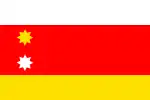 Flag  Coat of arms | |
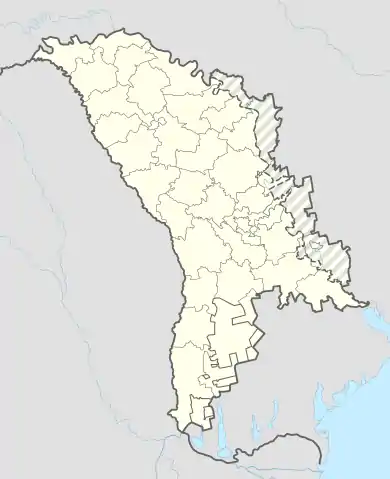 Orhei Location within Moldova | |
| Coordinates: 47°23′N 28°49′E / 47.383°N 28.817°E | |
| Country | Moldova |
| County | Orhei District |
| Government | |
| • Mayor | Tatiana Cociu (FASM) |
| Area | |
| • Total | 8.5 km2 (3.3 sq mi) |
| Population | |
| • Total | 21,065 |
| • Density | 2,500/km2 (6,400/sq mi) |
| Time zone | UTC+2 (EET) |
| • Summer (DST) | UTC+3 (EEST) |
Orhei (Romanian pronunciation: [orˈhej]), also formerly known as Orgeev (Russian: Орге́ев), is a city, municipality[2] and the administrative centre[3] of Orhei District in the Republic of Moldova, with a population of 21,065. Orhei is approximately 40 kilometres (25 miles) north of the capital, Chișinău.
History
Orhei takes its name from the Hungarian Őrhely, lit. 'guard post', as it was an outpost of the Hungarian army guarding the gyepű.[4] It was the Ottoman-occupied military center of northern Bessarabia until it was ceded to the Russian Empire in 1812. The word "orhei" was used by local population, meaning "strengthened hill, fortress, deserted courtyard".[5] The name "Orhei" is, derived from the Hungarian word Őrhely or Várhely, the earlier meaning "lookout post", dating from the 13th century, when Hungarian forces built a series of defences in the area.[6] Orhei gets its name from Orheiul Vechi, an active monastery near the village of Ivancea.
Like the rest of Bessarabia, Orhei was taken by the Kingdom of Romania after World War I and was annexed by the USSR in 1940. It was liberated from Axis forces on 6 April 1944, during the Uman–Botoșani Offensive, and was rebuilt after the war. In 1991 it became part of the Republic of Moldova.
Prior to 2003, Orhei was the capital of Orhei County, a large administrative region, but the country was divided further into Raion, or districts.
The St. Dumitru Church built by Vasile Lupu is located in this town.
Ilan Shor was elected mayor in 2015; he served until 2019. Pavel Verejanu won the 2019 mayoral election in 2019,[7] with about 80% of the vote. Verejanu was Shor's preferred candidate.
Demographics
According to the 2014 census, the population of Orhei amounted to 21,065 inhabitants (making it the ninth largest city in Moldova), a decrease compared to the previous census in 2004, when 25,641 inhabitants were registered. Of these, 10,032 were men and 11,033 were women.[8]
Ethnic composition of Orhei (2014)[9]
Footnotes:
* There is an ongoing controversy regarding the ethnic identification of Moldovans and Romanians.
* Moldovan language is one of the two local names for the Romanian language in Moldova. In 2013, the Constitutional Court of Moldova interpreted that Article 13 of the constitution is superseded by the Declaration of Independence,[11] thus giving official status to the name Romanian.[12][13]
While Orhei was still within Bessarabia, the population in 1920 was estimated to be 25,000. At that time, two-thirds of the population were Jewish. The remaining population was Russian, Romanian and Ruthenians.[14]
| Year | Pop. | ±% |
|---|---|---|
| 1897 | 12,336 | — |
| 1930 | 15,279 | +23.9% |
| 1959 | 14,131 | −7.5% |
| 1970 | 25,707 | +81.9% |
| 1979 | 30,260 | +17.7% |
| 1989 | 38,038 | +25.7% |
| 2004 | 25,641 | −32.6% |
| 2014 | 21,065 | −17.8% |
Religion
.jpg.webp)
.jpg.webp)
Orhei was home to many Jews prior to World War II, and has a large Jewish cemetery. There is only one active synagogue left in the community. The main churches are Romanian Orthodox and Russian Orthodox. Also in the area are: Baptist, Roman Catholic, Seventh-day Adventist Church, the Church of Jesus Christ of Latter-day Saints, the Salvation Army, and Jehovah's Witnesses.
Economy
Orhei was the first place in what was then known as Bessarabia, to have a successful tobacco industry. The area is also known for wine production.[14]
Sport
FC Milsami Orhei is based in the city. The team won the Moldovan National Division in 2015.
Media
Orhei has two local radio stations: Radio Orhei (101.6 FM) founded in 2005, contains news from region and republic.[15] In 2018, its name was cloned by a broadcaster affiliated to the Șor Party – Radio Orhei FM (97.5 FM).[16][17] Radio Orhei FM broadcasts news from the Orhei region, Moldova national news, international news, and Russian, Moldovan, and Romanian music.[18] There is also an Orhei City Hall site.[19]
Natives
- Jacobo Fijman
- Dovid Knut
- Mihail Maculețchi
- Alex Magala
- Rodica Mahu
- Pasha Parfeny
International relations
Twin towns – Sister cities
Orhei is twinned with:
Gallery
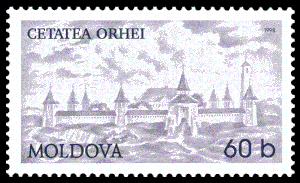
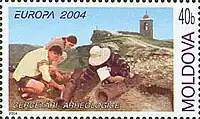
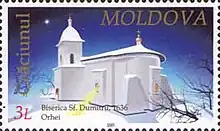
 Interwar Coat of Arms of Orhei
Interwar Coat of Arms of Orhei
References
- ↑ Results of Population and Housing Census in the Republic of Moldova in 2014: "Characteristics - Population (population by communes, religion, citizenship)" (XLS). National Bureau of Statistics of the Republic of Moldova. 2017. Retrieved 1 May 2017.
- ↑ LEGE Nr. 248 din 03.11.2016 pentru modificarea și completarea Legii nr. 764-XV din 27 decembrie 2001 privind organizarea administrativ-teritorială a Republicii Moldova (in Romanian)
- ↑ http://www.natura2000oltenita-chiciu.ro/wp-content/uploads/2019/05/Moldova-Pitoreasca-Picturesque-Moldavia-pdf-Vladimir-Toncea.pdf
- ↑ Faragó, Imre (2014). Márton, Mátyás (ed.). Domborzat- és tájábrázolás (PDF). Vol. Sokrétű térképészet II. Eötvös Loránd Tudományegyetem Informatikai Kar. p. 985. ISBN 978-963-284-468-8.
- ↑ Teodor PORUCIC - Lexiconul termenilor entropici din limba română în Basarabia, extras din Arhivele Basarabiei, 1931, nr. 1-4, Chişinău
- ↑ Nándor Bárdi, László Diószegi, András Gyertyánfy, "Hungarians in Moldavia", Magyar Kisebbség 1–2 (7–8), 1997 (III), pp. 370–390.
- ↑ "Nu scuipați împotriva vântului. Ilan Șor despre contestarea de către Blocul ACUM a victoriei Partidului ȘOR în mun. Orhei". 25 October 2019.
- ↑ "2014 Moldova Census of Population and Housing". National Bureau of Statistics of the Republic of Moldova. (in Romanian, Russian, and English)
- ↑ "2014 Moldova Census of Population and Housing". National Bureau of Statistics of the Republic of Moldova. (in Romanian, Russian, and English)
- ↑ "2014 Moldova Census of Population and Housing". National Bureau of Statistics of the Republic of Moldova. (in Romanian, Russian, and English)
- ↑ "Hotărâre Nr. 36 din 05.12.2013 privind interpretarea articolului 13 alin. (1) din Constituție în corelație cu Preambulul Constituției și Declarația de Independență a Republicii Moldova (Sesizările nr. 8b/2013 și 41b/2013)" (in Romanian). Constitutional Court of Moldova. Archived from the original on 5 March 2016. Retrieved 20 December 2013.
124. ... Prin urmare, Curtea consideră că prevederea conținută în Declarația de Independență referitoare la limba română ca limbă de stat a Republicii Moldova prevalează asupra prevederii referitoare la limba moldovenească conținute în articolul 13 al Constituției.
[124. ... Therefore, the Court considers that the provision contained in the Declaration of Independence regarding the Romanian language as the state language of the Republic of Moldova prevails over the provision regarding the Moldovan language contained in Article 13 of the Constitution.] - ↑ "Moldovan court rules official language is 'Romanian', replacing Soviet-flavored 'Moldovan'". Fox News. Associated Press. 5 December 2013. Archived from the original on 9 December 2013. Retrieved 7 December 2013.
- ↑ "Chisinau Recognizes Romanian As Official Language". Radio Free Europe/Radio Liberty. 5 December 2013. Archived from the original on 23 September 2016. Retrieved 11 March 2014.
- 1 2 Kaba, John (1919). Politico-economic Review of Basarabia. United States: American Relief Administration. p. 14.
- ↑ http://radioorhei.info
- ↑ http://media-azi.md/en/stiri/orhei-radio-station-%E2%80%98cloned%E2%80%99-%E2%80%93-how-and-whose-benefit
- ↑ http://media-azi.md/en/stiri/radio-orhei-litigation-bcc-after-their-name-was-%E2%80%98cloned%E2%80%99
- ↑ "Radio Orhei Fm 97,5". Archived from the original on 16 June 2021. Retrieved 15 July 2022.
- ↑ http://www.orhei.md
- ↑ "Piatra Neamț – Twin Towns". 2007–2008 piatra-neamt.net. Archived from the original on 16 November 2009. Retrieved 27 September 2009.
Further reading
- Orgeyev/Orhei (pp. 372–375) at Miriam Weiner's Routes to Roots Foundation
.jpg.webp)
.jpg.webp)

.jpg.webp)
.jpg.webp)
.jpg.webp)
